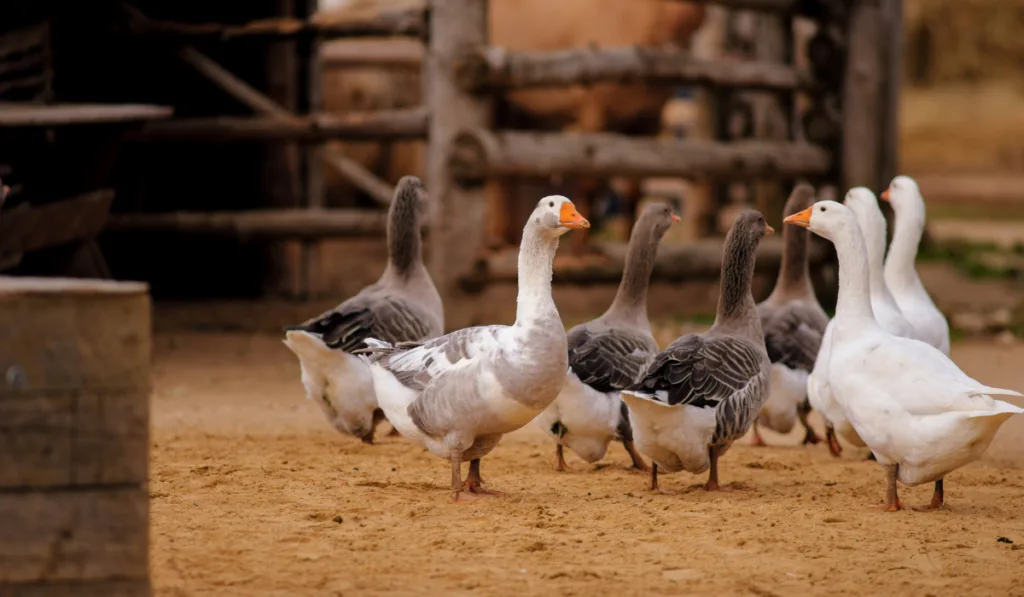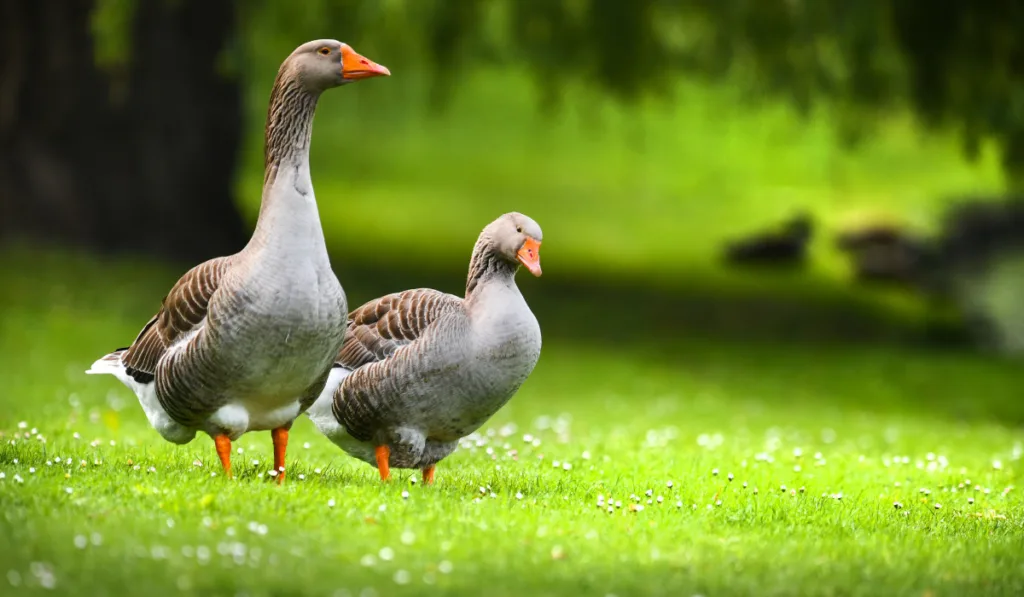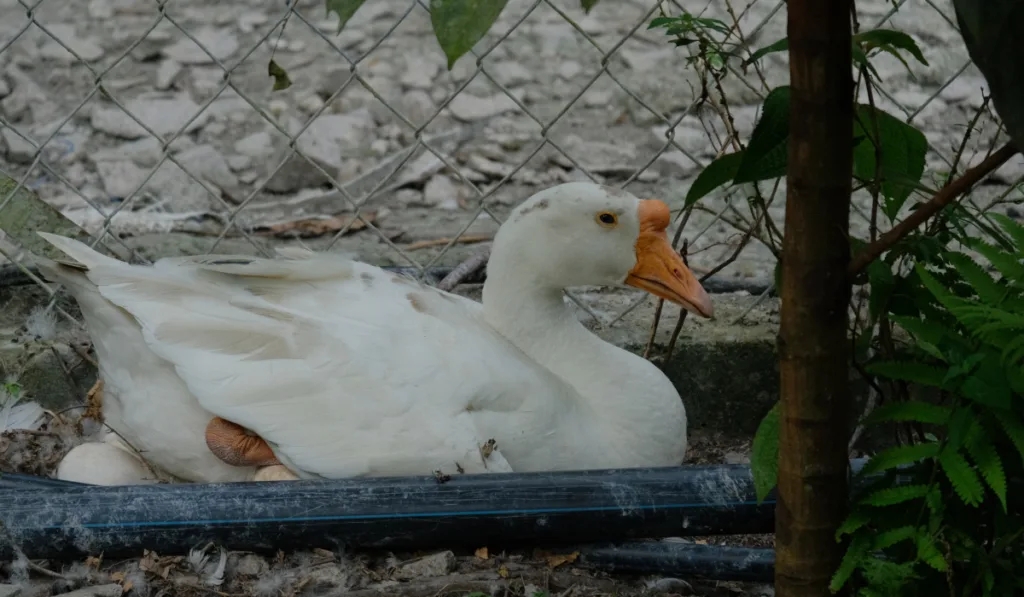Did you know that people have been domesticating geese since the 4th century? However, they only served the purpose of pets and meat production. As a result, there is the need to be more focused on geese egg production.
Like other poultry birds, geese also lay eggs. So, how many eggs do they lay? Are they edible? Luckily, this article is here to answer all your questions about geese egg production.
How many eggs do geese lay?
Geese are less prolific than other poultry birds and lay 30-50 eggs yearly, depending on the breed and age. Crossbreeds are more prolific than purebred geese.
Environmental factors, including wind velocity and temperature, also influence egg production in geese.
Please keep reading to learn how many eggs different geese breeds lay and whether the female geese need a male to lay eggs. We also examine whether you can eat geese eggs and how many eggs a goose can sit on. Let’s dive in!

Table of Contents
How Many Eggs Do Geese Lay?
Geese are not prolific layers like other poultry birds, such as chickens, turkeys, or ducks.
They lay about 30-50 eggs annually, depending on the breed.
Most geese go broody after laying a clutch of 12-15 eggs.
However, some breeds lay more eggs than others. Environmental factors, including temperatures and wind speed, also determine egg production in geese.
The laying season for most birds, including geese and waterfowl, begins within 5 to 6 days of the end of winter. Continued freeze-ups may delay the birds’ laying onset and cause a widespread effect on their production cycle.
For instance, if the minimum temperature continuously drops below 35°F (1.7°C) for 24 hours, egg production may decline by 20-25%. Also, when temperatures are too low, the geese’s protective reaction to wind overconsumes energy. As a result, egg production goes down.
Moreover, if storms occur during the laying season, they could destroy the birds’ nesting. Hence this will cause instability and stress to the geese, affecting their egg production.
Do Different Breeds Have Different Averages?
As discussed above, egg production in geese depends on breed, nutrition, and habitat conditions.
Different breeds of goose have varying egg production capacities.
The table below shows the average egg production for some of the most popular geese breeds.
| Geese breed | Number of eggs (per year) |
| African | 20 to 40 |
| Diepholz | 35 to 45 |
| Pilgrim | 35 to 45 |
| Embden | 10 to 30 |
| Egyptian | 5 to 10 |
| Toulouse | 25 to 40 |
| Chinese | 40 to 100 |
Do Farm Geese Lay More Eggs Than Wild Geese?
It is still being determined whether farm geese lay more eggs than wild geese. While it is easy to tell how many eggs farm geese lay, wild geese are secretive.
They fly in and out of their nests and use different routes each time. Thus, they leave no scent or trails as a protective measure to keep predators away. Therefore, it is hard to know how many eggs wild geese lay.
However, domestic geese have higher chances of laying more eggs because:
- You can warm your domestic geese’s housing during extended, severe freezing temperatures. Hence their egg production will be stable and unaffected by the cold.
- Domestic geese suffer less stress than wild geese. For instance, while storms and intense winds destroy the habitats of wild geese and disrupt their nesting, domestic geese enjoy permanent, safe shelter.

How to Increase Egg Production in Domestic Geese?
Did you know that you can help increase the number of eggs your geese lay? If you are a commercial goose keeper, there are many ways you can improve your birds’ production capacity. They include:
- Using artificial lighting
- Genetic upgrading and crossbreeding
- Improving nutrition
Using Artificial Lighting
Research has shown that supplementing natural light with artificial lighting can increase egg production.
For instance, if daytime lighting in geese’s housing increased to 12 to 13.5 hours, they laid 47.6 eggs per bird, up from 26.4.
Genetic Upgrading and Crossbreeding
Genetic modification and crossbreeding of selected geese breeds can significantly increase the number and weight of eggs.
A feasible example is a cross between the Chinese breeds, which are small-bodied but prolific layers, with a larger one, such as Carlos.
The offspring would be a higher producer of eggs and meat.
Improving Nutrition
You can help maximize egg production in domestic geese by improving their dietary intake. For instance, increasing protein content feeds for one-year-old geese when there is no green forage increases egg production.

Do You Have to Have a Male Goose (Gander) For the Female to Lay Eggs?
It is not a must to have a male goose (gander) for your female goose to lay eggs. Geese lay eggs with or without males.
However, the eggs will be unfertilized. Unfertilized goose eggs cannot hatch and are, therefore, suitable only for eating.
If you want to produce eggs for hatching, you must have a gander, so they can mate before they start laying. Like chicken, turkey, or duck eggs, if you produce geese eggs for consumption, you do not have to keep male geese.
Can You Eat Goose Eggs?
Goose eggs are safe for human consumption.
They are very nutritious; one cooked goose egg contains 19g protein, 26g fat, and 1.8g carbohydrates.
But to many, their taste is too strong compared to duck or hen eggs. Thus, they are less preferred for eating. However, most people like them for their shells for making decorative art pieces.

How Many Eggs Can a Goose Sit On?
Some goose keepers use incubators because females sometimes refuse to sit on their eggs, especially if some are bad.
However, the most efficient way of hatching the eggs is by natural geese brooding.
How many eggs can a goose sit on?
A goose can sit on 10 to 15 eggs, depending on the size of the goose and the eggs. Smaller geese breeds will be able to cover fewer eggs compared to larger breeds.
Similarly, if the eggs are small-sized, the number that a goose can sit on will be higher.
Final Thoughts
Although geese are not prolific egg producers, they lay an average of 30 to 50 eggs yearly. Goose eggs can be a great source of nutrition for your family. Their production capacity depends on the breed, habitat, nutrition, and weather conditions.
However, you can help improve your birds’ productivity through crossbreeding, improved nutrition, and supplementary lighting. With these tips, you can increase profitability and enjoy keeping your feathered friends.
Resources
I wrote this article from my experience rearing geese and the following sources:
- https://www.ncbi.nlm.nih.gov/pmc/articles/PMC6070935/
- https://ask.usda.gov/s/article/Are-goose-eggs-safe-to-eat
- https://www.nutritionvalue.org/Goose_egg%2C_cooked_31202000_nutritional_value.html
- https://www.dpi.nsw.gov.au/animals-and-livestock/poultry-and-birds/species/geese-raising/egg-production
- https://www.sciencedirect.com/topics/agricultural-and-biological-sciences/geese
- https://www.sciencedirect.com/science/article/pii/
- https://www.researchgate.net/publication/23254845_Supplementary_artificial_light_to_increase_egg_production_of_geese_under_natural_lighting_conditions
- https://journals.tubitak.gov.tr/cgi/viewcontent.cgi?article=4172&context=veterinary
- https://www.cabi.org/Uploads/animal-science/worlds-poultry-science-association/WPSA-hungary-2005/64-73Bogenfust.pdf
- https://livestockconservancy.org/heritage-breeds/heritage-breeds-list/african-goose/
- https://livestockconservancy.org/heritage-breeds/heritage-breeds-list/toulouse-goose/
- http://www.zooenc.eu/en/diepholz-goose/
- https://livestockconservancy.org/heritage-breeds/heritage-breeds-list/pilgrim-goose/
- https://kidadl.com/facts/animals/embden-goose-facts
- https://www.oaklandzoo.org/animals/egyptian-goose
- https://livestockconservancy.org/heritage-breeds/heritage-breeds-list/chinese-goose/
